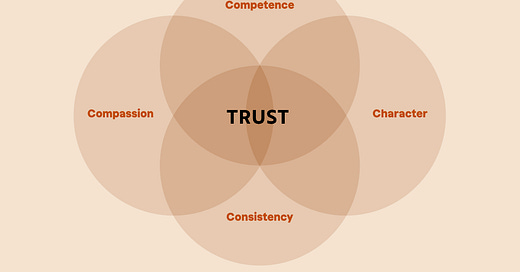Trust is one of the most complex and fragile aspects of human relationships. It governs our personal and professional interactions and influences how we navigate the world. Yet, many of us struggle with trust—either giving it away too easily or withholding it due to past betrayals. Understanding the mechanisms of trust can help us make better decisions and foster healthier relationships. Here are four secrets that will fundamentally change how you see people and, in turn, how you build trust.
1. Trust is Not Binary—It’s a Spectrum
One of the biggest misconceptions about trust is that it’s an all-or-nothing proposition. We often assume that we must either trust someone completely or not at all. This binary thinking leads to poor judgment and unnecessary heartbreak. The reality is that trust exists on a spectrum, and people earn it gradually.
Rather than immediately categorizing people as trustworthy or untrustworthy, it’s helpful to start with neutral trust. This means approaching new relationships with an open but cautious mindset. Instead of making snap judgments based on first impressions, allow time and experience to shape your trust in a person.
Psychologists call this the halo effect, where one positive trait influences our perception of an entire person. If someone is charismatic, articulate, or attractive, we may subconsciously assume they are also honest and reliable. However, charisma is not a measure of trustworthiness. By adopting a neutral stance, you give people the opportunity to demonstrate their consistency and integrity over time.
2. Contractual Trust is the Foundation
Trust is often romanticized, especially in personal relationships, but in reality, it begins at a very practical level—contractual trust. This level of trust is based on whether people follow through on their commitments, keep their word, and respect agreements. It applies to every area of life: business, friendships, dating, and even casual social interactions.
For instance, if someone promises to call at a certain time, do they follow through? If they say they’ll complete a task, do they deliver? These small yet significant actions form the foundation of trust. Without contractual trust, deeper levels of trust cannot develop.
We often overlook this stage because we desire emotional connection and chemistry, but consistency is what truly sustains relationships. Before investing emotionally, observe whether someone reliably meets their commitments. If they do, they may be capable of deeper trust. If they don’t, it’s a red flag that shouldn’t be ignored.
3. Reciprocal Trust Strengthens Relationships
Once someone has proven their reliability, trust can evolve into reciprocal trust, where both parties support each other without keeping a strict tally of who gives and who receives. In strong relationships, trust is mutual, flexible, and generous. You help each other without fear of being exploited or shortchanged.
At this stage, the relationship moves beyond mere transactions. You begin to rely on each other not just for commitments but for emotional and moral support. However, this level of trust should still be approached with awareness. While reciprocal trust brings warmth and connection, it should be balanced with discernment. Just because a relationship is reciprocal doesn’t mean it is unconditional. Trust must be continually maintained and nurtured.
4. Pure Trust is Rare—and That’s Okay
The highest level of trust is pure trust, where you feel completely safe with someone. This is the level of trust people often seek in close friendships, family, and romantic relationships. It allows for total vulnerability and honesty.
However, one of the biggest mistakes people make is giving pure trust too soon. Many assume that trust should start at this level, only to experience deep disappointment when the other person proves unreliable. Instead, trust should be built progressively. The heartbreak of betrayal often comes from misplacing trust rather than recognizing where a person actually belongs on the spectrum.
Pure trust is rare because it requires years of consistency, shared experiences, and mutual commitment. Not everyone in your life needs to reach this level. Many relationships function well at the contractual or reciprocal level, and that’s perfectly fine. Understanding this prevents unrealistic expectations and unnecessary emotional turmoil.
The Four Types of Trust
To better navigate trust, it’s essential to recognize that different people fulfill different trust roles in our lives. Instead of expecting one person to be everything, we can categorize trust into four distinct types:
1. Competence Trust – Some people are highly skilled and knowledgeable in specific areas, making them reliable sources for advice and expertise. However, their competence does not necessarily mean they care about your well-being.
2. Care Trust – Certain people deeply care for you and want the best for you. They provide emotional support, but they may not be the best sources for practical guidance.
3. Consistency Trust – These are the people who have been in your life through thick and thin. They may not always have the best advice or the deepest emotional connection, but they are reliable and always present.
4. Character Trust – These individuals live by strong moral principles and integrity. They inspire you to be a better person, but they may not always be involved in the day-to-day aspects of your life.
By identifying the type of trust each person provides, you can build healthier relationships without unrealistic expectations. You may not turn to a caring friend for financial advice, just as you wouldn’t expect a competent business associate to offer deep emotional support. This understanding helps prevent disappointment and strengthens the bonds you share with others.
Final Thoughts
Trust is not a simple yes-or-no decision; it is a nuanced process that requires patience, discernment, and self-awareness. By recognizing that trust is a spectrum, valuing consistency, nurturing reciprocity, and understanding the different roles people play in our lives, we can cultivate stronger, healthier, and more fulfilling relationships.
Instead of asking, "Can I trust this person?" ask, "At what level can I trust this person?" By shifting your mindset, you protect yourself from unnecessary heartbreak while opening the door to deeper and more meaningful connections.



